九年级英语重点单词复习
九年级全册英语重点单词归纳
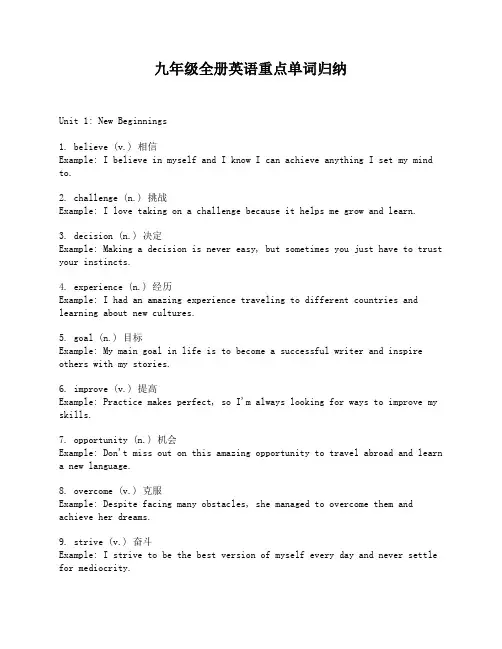
九年级全册英语重点单词归纳Unit 1: New Beginnings1. believe (v.) 相信Example: I believe in myself and I know I can achieve anything I set my mind to.2. challenge (n.) 挑战Example: I love taking on a challenge because it helps me grow and learn.3. decision (n.) 决定Example: Making a decision is never easy, but sometimes you just have to trust your instincts.4. experience (n.) 经历Example: I had an amazing experience traveling to different countries and learning about new cultures.5. goal (n.) 目标Example: My main goal in life is to become a successful writer and inspire others with my stories.6. improve (v.) 提高Example: Practice makes perfect, so I'm always looking for ways to improve my skills.7. opportunity (n.) 机会Example: Don't miss out on this amazing opportunity to travel abroad and learn a new language.8. overcome (v.) 克服Example: Despite facing many obstacles, she managed to overcome them and achieve her dreams.9. strive (v.) 奋斗Example: I strive to be the best version of myself every day and never settle for mediocrity.10. unique (adj.) 独特的Example: Each person has their own unique qualities that make them special and worth knowing.Unit 2: Going Global1. communication (n.) 沟通Example: Good communication skills are essential for building strong relationships.2. global (adj.) 全球的Example: In today's global economy, it's important to have a broad understanding of different cultures.3. impact (n.) 影响Example: His speech had a great impact on the audience and inspired many people.4. opportunity (n.) 机会Example: Studying abroad offers a great opportunity to learn a new language and experience a different culture.5. recognize (v.) 认出Example: I couldn't recognize her at first because she had changed so much over the years.6. society (n.) 社会Example: It is important for individuals to contribute to society and make a positive difference.7. tradition (n.) 传统Example: Every year, we gather together as a family to celebrate our cultural traditions.8. view (n.) 观点Example: Everyone has their own unique point of view, and it's important to respect and listen to others.9. worldwide (adj.) 世界范围的Example: The internet has made it possible for people to connect with others worldwide.10. youth (n.) 青少年Example: The youth of today are the leaders of tomorrow, so it's important to invest in their education and development.Unit 3: Incredible Stories1. adventure (n.) 冒险Example: Going on an adventure allows you to step out of your comfort zone and experience new things.2. ancient (adj.) 古老的Example: The ancient ruins are a testament to the rich history of this country.3. creature (n.) 生物Example: The deep sea is home to many unique and fascinating creatures.4. danger (n.) 危险Example: Climbing Mount Everest is not for the faint of heart, as it is filled with many dangers.5. escape (v.) 逃离Example: The prisoners managed to escape from their cells using a secret tunnel.6. legend (n.) 传说Example: This story has become a legend in our family, passed down from generation to generation.7. treasure (n.) 宝藏Example: Pirates often went on adventures in search of hidden treasures.8. voyage (n.) 航行Example: The explorers embarked on a voyage to discover new lands and trade routes.9. witness (v.) 目击Example: I was a witness to the car accident and had to testify in court.10. mystery (n.) 神秘Example: The disappearance of the missing hiker remains a mystery to this day.Unit 4: Science and Technology1. advance (n.) 进步Example: The latest advance in technology has revolutionized the way we live our lives.2. discover (v.) 发现Example: Scientists discovered a new species of dinosaur in the remote jungle.3. experiment (n.) 实验Example: The chemistry class conducted an experiment to see how different substances react with each other.4. invention (n.) 发明Example: The light bulb is one of Thomas Edison's most famous inventions.5. research (n.) 研究Example: He spent years conducting extensive research on the effects of climate change.6. scientist (n.) 科学家Example: Many great scientists have dedicated their lives to making groundbreaking discoveries.7. technology (n.) 技术Example: The rapid advancement of technology has greatly improved our quality of life.8. theory (n.) 理论Example: Einstein's theory of relativity revolutionized our understanding of space and time.9. universe (n.) 宇宙Example: The universe is vast and full of mysteries waiting to be explored.10. experiment (v.) 实验Example: The students were excited to experiment with different chemicals in the lab.Unit 5: Heroes1. courage (n.) 勇气Example: It takes a lot of courage to stand up for what you believe in, even when faced with opposition.2. hero (n.) 英雄Example: Firefighters are often seen as heroes because they put their lives on the line to save others.3. inspire (v.) 激励Example: Her determination and hard work inspire me to never give up on my dreams.4. sacrifice (n.) 牺牲Example: Soldiers make great sacrifices to protect their country and ensureits safety.5. bravery (n.) 勇敢Example: The young boy showed bravery by confronting the bully and standing up for his classmate.6. legend (n.) 传奇Example: Michael Jordan is a basketball legend who inspired a whole generation of athletes.7. respect (n.) 尊重Example: It's important to treat everyone with respect and kindness, regardless of their background or beliefs.8. selfless (adj.) 无私的Example: Mother Teresa dedicated her life to helping the poor and needy, showing selfless love and compassion.9. admire (v.) 钦佩Example: I admire her for her resilience and determination to overcome any challenges that come her way.10. honor (n.) 荣誉Example: He was awarded a medal of honor for his brave actions during the war.Unit 6: Healthy Living1. diet (n.) 饮食Example: A balanced diet is essential for maintaining good health and preventing diseases.2. exercise (n.) 锻炼Example: Regular exercise can help improve cardiovascular health and strengthen muscles.3. lifestyle (n.) 生活方式Example: Adopting a healthy lifestyle involves making mindful choices about what we eat and how active we are.4. nutrition (n.) 营养Example: The nutritionist advised me to eat a variety of fruits and vegetables to ensure I get all the necessary nutrients.5. physical (adj.) 身体的Example: Regular physical activity is important for maintaining a healthy weight and reducing the risk of chronic diseases.6. sleep (n.) 睡眠Example: Lack of sleep can negatively impact our mood and cognitive functioning.7. stress (n.) 压力Example: Learning effective stress management techniques can help reduce the negative effects of stress on our health.8. wellbeing (n.) 健康Example: Mental and emotional wellbeing are just as important as physical health.9. balance (n.) 平衡Example: Finding a balance between work, social life, and personal time is crucial for overall wellbeing.10. hygiene (n.) 卫生Example: Good personal hygiene, such as regular handwashing, can help prevent the spread of germs and diseases.Unit 7: Nature and the Environment1. conservation (n.) 保护Example: The conservation of natural resources is important for the sustainability of our planet.2. environment (n.) 环境Example: We must take care of our environment and make conscious choices to reduce pollution and waste.3. pollution (n.) 污染Example: Air pollution from factories and vehicles is a major concern forpublic health.4. recycle (v.) 回收利用Example: Recycling paper and plastic helps reduce waste and conserve resources.5. renewable (adj.) 可再生的Example: Solar and wind energy are examples of renewable energy sources.6. species (n.) 物种Example: Many endangered species are at risk of extinction due to loss of habitat.7. deforestation (n.) 森林砍伐Example: Deforestation is causing the loss of biodiversity and contributes to climate change.8. ecosystem (n.) 生态系统Example: A healthy ecosystem relies on the balance between different species and their environment.9. natural (adj.) 自然的Example: National parks are protected areas that preserve the natural beauty and wildlife.10. waste (n.) 浪费Example: The excessive use of plastic contributes to waste and pollution inour environment.Unit 8: Society and Culture1. celebrate (v.) 庆祝Example: We celebrate birthdays to mark the day of our birth and show appreciation for another year of life.2. community (n.) 社区Example: Getting involved in your local community can help build social connections and make a positive impact.3. culture (n.) 文化Example: Each country has its own unique culture, including language, traditions, and customs.4. festival (n.) 节日Example: Chinese New Year is a major festival celebrated by people of Chinese descent all over the world.5. tradition (n.) 传统Example: It is important to preserve and pass on cultural traditions from one generation to the next.6. diversity (n.) 多样性Example: Cultural diversity enriches our society and allows us to learn from one another's experiences and perspectives.7. language (n.) 语言Example: Learning a foreign language opens up opportunities for communication and understanding with people from different cultures.8. society (n.) 社会Example: A just and equitable society is one where everyone has equal rights and opportunities.9. value (n.) 价值观Example: Honesty, respect, and kindness are some of the values that are important in building a strong and supportive community.10. customs (n.) 风俗Example: The customs and rituals surrounding weddings vary greatly across different cultures and religions.Unit 9: Education and Careers1. career (n.) 职业Example: Choosing a career that aligns with your interests and passions can lead to a fulfilling and rewarding life.2. knowledge (n.) 知识Example: Education helps broaden our knowledge and provides us with new opportunities.3. skill (n.) 技能Example: Communication skills and problem-solving skills are highly valued in the workplace.4. graduate (n.) 毕业生Example: After years of hard work, I am proud to say that I am a high school graduate.5. profession (n.) 职业Example: Teachers, doctors, and lawyers are examples of professions that require specialized training and education.6. opportunity (n.) 机会Example: Education opens doors to new opportunities and helps build a better future.7. achieve (v.) 实现Example: With hard work and dedication, you can achieve anything you set your mind to.8. success (n.) 成功Example: Success means different things to different people; it could be achieving personal goals or making a positive impact on others.9. university (n.) 大学Example: Many students aspire to attend a prestigious university to further their education and expand their horizons.10. scholarship (n.) 奖学金Example: She was awarded a scholarship for her outstanding academic achievements.。
初三英语单词全册重点知识整理
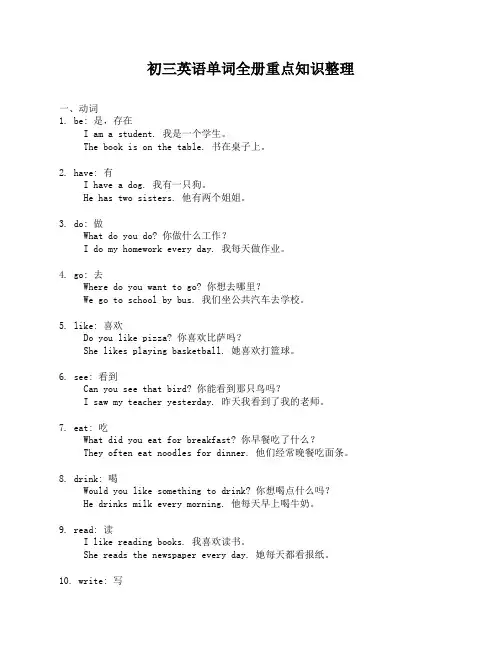
初三英语单词全册重点知识整理一、动词1. be: 是,存在I am a student. 我是一个学生。
The book is on the table. 书在桌子上。
2. have: 有I have a dog. 我有一只狗。
He has two sisters. 他有两个姐姐。
3. do: 做What do you do? 你做什么工作?I do my homework every day. 我每天做作业。
4. go: 去Where do you want to go? 你想去哪里?We go to school by bus. 我们坐公共汽车去学校。
5. like: 喜欢Do you like pizza? 你喜欢比萨吗?She likes playing basketball. 她喜欢打篮球。
6. see: 看到Can you see that bird? 你能看到那只鸟吗?I saw my teacher yesterday. 昨天我看到了我的老师。
7. eat: 吃What did you eat for breakfast? 你早餐吃了什么?They often eat noodles for dinner. 他们经常晚餐吃面条。
8. drink: 喝Would you like something to drink? 你想喝点什么吗?He drinks milk every morning. 他每天早上喝牛奶。
9. read: 读I like reading books. 我喜欢读书。
She reads the newspaper every day. 她每天都看报纸。
10. write: 写Can you write your name? 你能写你的名字吗?They write letters to each other. 他们互相写信。
二、名词1. book: 书This is a good book. 这是一本好书。
初三英语重点单词知识点人教版
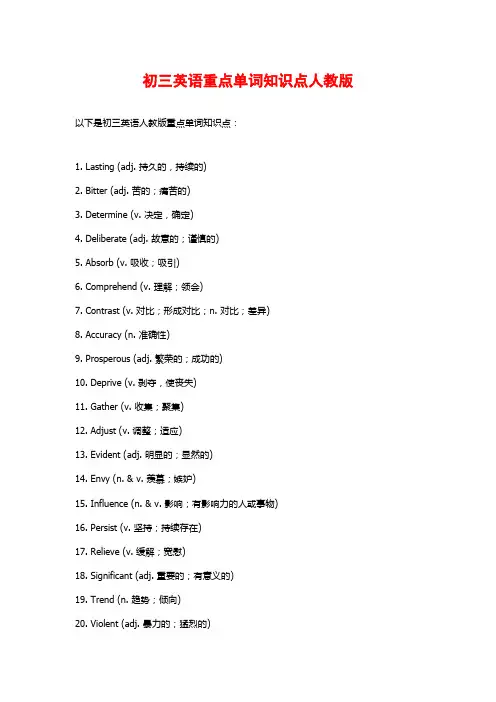
初三英语重点单词知识点人教版以下是初三英语人教版重点单词知识点:
1. Lasting (adj. 持久的,持续的)
2. Bitter (adj. 苦的;痛苦的)
3. Determine (v. 决定,确定)
4. Deliberate (adj. 故意的;谨慎的)
5. Absorb (v. 吸收;吸引)
6. Comprehend (v. 理解;领会)
7. Contrast (v. 对比;形成对比;n. 对比;差异)
8. Accuracy (n. 准确性)
9. Prosperous (adj. 繁荣的;成功的)
10. Deprive (v. 剥夺,使丧失)
11. Gather (v. 收集;聚集)
12. Adjust (v. 调整;适应)
13. Evident (adj. 明显的;显然的)
14. Envy (n. & v. 羡慕;嫉妒)
15. Influence (n. & v. 影响;有影响力的人或事物)
16. Persist (v. 坚持;持续存在)
17. Relieve (v. 缓解;宽慰)
18. Significant (adj. 重要的;有意义的)
19. Trend (n. 趋势;倾向)
20. Violent (adj. 暴力的;猛烈的)
这些单词在初三英语学习中经常出现,掌握它们的词义和用法将有助于提高词汇水平和语言表达能力。
九年级全一册重点英语单词
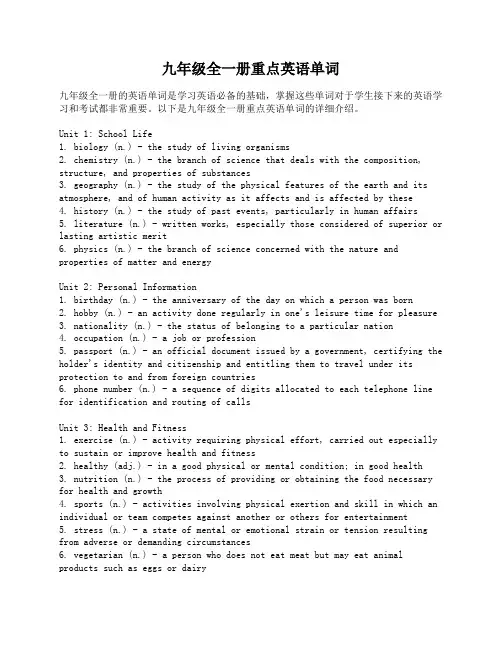
九年级全一册重点英语单词九年级全一册的英语单词是学习英语必备的基础,掌握这些单词对于学生接下来的英语学习和考试都非常重要。
以下是九年级全一册重点英语单词的详细介绍。
Unit 1: School Life1. biology (n.) - the study of living organisms2. chemistry (n.) - the branch of science that deals with the composition, structure, and properties of substances3. geography (n.) - the study of the physical features of the earth and its atmosphere, and of human activity as it affects and is affected by these4. history (n.) - the study of past events, particularly in human affairs5. literature (n.) - written works, especially those considered of superior or lasting artistic merit6. physics (n.) - the branch of science concerned with the nature and properties of matter and energyUnit 2: Personal Information1. birthday (n.) - the anniversary of the day on which a person was born2. hobby (n.) - an activity done regularly in one's leisure time for pleasure3. nationality (n.) - the status of belonging to a particular nation4. occupation (n.) - a job or profession5. passport (n.) - an official document issued by a government, certifying the holder's identity and citizenship and entitling them to travel under its protection to and from foreign countries6. phone number (n.) - a sequence of digits allocated to each telephone line for identification and routing of callsUnit 3: Health and Fitness1. exercise (n.) - activity requiring physical effort, carried out especially to sustain or improve health and fitness2. healthy (adj.) - in a good physical or mental condition; in good health3. nutrition (n.) - the process of providing or obtaining the food necessary for health and growth4. sports (n.) - activities involving physical exertion and skill in which an individual or team competes against another or others for entertainment5. stress (n.) - a state of mental or emotional strain or tension resulting from adverse or demanding circumstances6. vegetarian (n.) - a person who does not eat meat but may eat animal products such as eggs or dairyUnit 4: Holidays1. celebrate (v.) - acknowledge (a significant or happy day or event) with a social gathering or enjoyable activity2. festival (n.) - a day or period of celebration, typically for religious reasons3. present (n.) - a thing given to someone as a gift4. tradition (n.) - the transmission of customs or beliefs from generation to generation, or the fact of being passed on in this way5. vacation (n.) - an extended period of leisure and recreation, especiallyone spent away from home or traveling6. wish (v.) - feel or express a strong desire or hope for something that is not easily attainableUnit 5: Science and Technology1. experiment (n.) - a scientific procedure undertaken to make a discovery,test a hypothesis, or demonstrate a known fact2. invention (n.) - the action of inventing something, typically a process or device3. laboratory (n.) - a room or building equipped for scientific experiments, research, or teaching, or for the manufacture of drugs or chemicals4. microscope (n.) - an optical instrument used for viewing very small objects, typically magnified several hundred times5. technology (n.) - the application of scientific knowledge for practical purposes, especially in industry6. theory (n.) - a supposition or a system of ideas intended to explain something, especially one based on general principles independent of the thing to be explainedUnit 6: Communication1. advice (n.) - guidance or recommendations concerning prudent future action, typically given by someone regarded as knowledgeable or authoritative2. conversation (n.) - a talk, especially an informal one, between two or more people in which news and ideas are exchanged3. language (n.) - the method of human communication, either spoken or written, consisting of the use of words in a structured and conventional way4. message (n.) - a verbal, written, or recorded communication sent to or left for a recipient who cannot be contacted directly5. speak (v.) - say something in order to convey information, an opinion, or a feeling6. write (v.) - mark (letters, words, or other symbols) on a surface,typically paper, with a pen, pencil, or similar implementUnit 7: Culture and Traditions1. art (n.) - the expression or application of human creative skill and imagination, typically in a visual form such as painting or sculpture, producing works that are appreciated primarily for their beauty or emotional power2. culture (n.) - the customs, arts, social institutions, and achievements ofa particular nation, people, or other social group3. dance (n.) - a series of movements that match the speed and rhythm of a piece of music4. tradition (n.) - the transmission of customs or beliefs from generation to generation, or the fact of being passed on in this way5. music (n.) - vocal or instrumental sounds (or both) combined in such a way as to produce beauty of form, harmony, and expression of emotion6. theater (n.) - a building or outdoor area in which plays, movies, or other dramatic performances are givenUnit 8: World Issues1. climate (n.) - the weather conditions prevailing in an area in general or over a long period of time2. disaster (n.) - a sudden event, such as an accident or a natural catastrophe, that causes great damage or loss of life3. environment (n.) - the surroundings or conditions in which a person, animal, or plant lives or operates4. pollution (n.) - the presence in or introduction into the environment of a substance or thing that has harmful or poisonous effects5. recycle (v.) - convert (waste) into reusable material6. waste (n.) - material that is not wanted; the unusable remains or by-products of somethingUnit 9: Travel and Transportation1. airplane (n.) - a powered flying vehicle with fixed wings and a weight greater than that of the air it displaces.2. boat (n.) - a small vessel for travel on water.3. train (n.) - a vehicle or conveyance that runs on rails and is propelled by steam, electricity, or an internal combustion engine.4. car (n.) - a wheeled motor vehicle used for transportation.5. bus (n.) - a large motor vehicle, typically having a long body, equipped with seats or benches for passengers, usually operating as part of a scheduled service on a route calling at a number of stops.6. bicycle (n.) - a vehicle with two wheels and a frame, propelled by pedals.Unit 10: Food and Nutrition1. fruit (n.) - the sweet and fleshy product of a tree or other plant that contains seed and can be eaten as food.2. vegetable (n.) - a plant or part of a plant used as food, typically as a savory dish or accompaniment.3. protein (n.) - any of a class of nitrogenous organic compounds that have large molecules composed of one or more long chains of amino acids and are an essential part of all living organisms, especially as structural components of body tissues such as muscle, hair, collagen, enzymes, and antibodies.4. carbohydrate (n.) - a substance, such as sugar or starch, that consists of carbon, hydrogen, and oxygen atoms, is an important energy source in the diet of animals, and is an important structural component of plants.5. fat (n.) - a ester of fatty acid and an alcohol, which is the chief constituent of the bodies of animals and plants.6. vitamin (n.) - any of a group of organic compounds that are essential for normal growth and nutrition and are required in small amounts in the diet because they cannot be synthesized by the body.Unit 11: Environment and Nature1. forest (n.) - a large area filled with trees and plants.2. ocean (n.) - a very large expanse of sea, in particular each of the main areas into which the sea is divided geographically.3. mountain (n.) - a large mass of earth and rock, rising above the common level or a large steep hill.4. river (n.) - a large natural stream of water flowing in a channel to the sea, a lake, or another river.5. animal (n.) - a living organism that feeds on organic matter, typically having specialized sense organs and nervous system and able to respond rapidly to stimuli.6. plant (n.) - a living organism of the kind exemplified by trees, shrubs, herbs, grasses, ferns, and mosses, typically growing in a permanent site, absorbing water and inorganic substances through its roots, and synthesizing nutrients in its leaves or stems by photosynthesis using the green pigment chlorophyll.Unit 12: Safety and Protection1. police (n.) - the civil force of a state, responsible for the maintenance of law and order, the prevention and detection of crime, and the enforcement of the criminal law.2. fireman (n.) - a person whose job is to extinguish fires and save people from burning buildings or other dangerous situations.3. doctor (n.) - a qualified medical practitioner.4. nurse (n.) - a person trained to care for the sick or infirm, especially ina hospital.5. ambulance (n.) - a vehicle equipped for taking sick or injured people to and from hospital quickly.6. helmet (n.) - a protective hat, typically made of hard material and worn by cyclists, motorcyclists, skiers, and others engaging in potentially hazardous activities.。
人教版九年级英语全册重点单词+短语+句型知识讲解
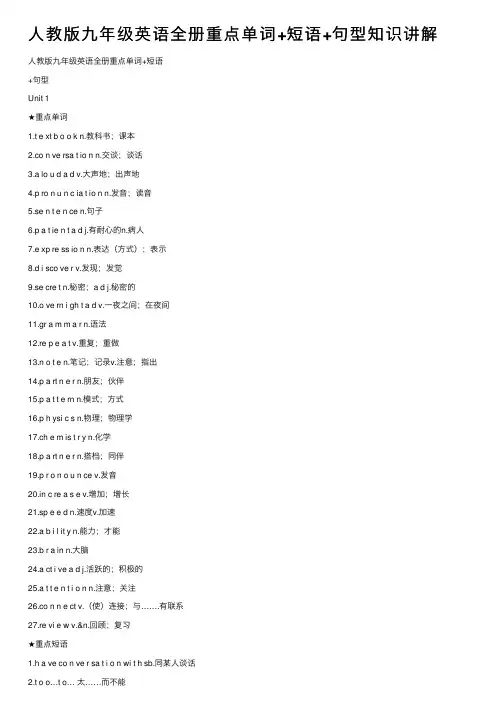
⼈教版九年级英语全册重点单词+短语+句型知识讲解⼈教版九年级英语全册重点单词+短语+句型Unit 1★重点单词1.t e xt b o o k n.教科书;课本2.co n ve rsa t io n n.交谈;谈话3.a lo u d a d v.⼤声地;出声地4.p ro n u n c ia t io n n.发⾳;读⾳5.se n t e n ce n.句⼦6.p a t ie n t a d j.有耐⼼的n.病⼈7.e xp re ss io n n.表达(⽅式);表⽰8.d i sco ve r v.发现;发觉9.se cre t n.秘密;a d j.秘密的10.o ve rn i gh t a d v.⼀夜之间;在夜间11.gr a m m a r n.语法12.re p e a t v.重复;重做13.n o t e n.笔记;记录v.注意;指出14.p a rt n e r n.朋友;伙伴15.p a t t e rn n.模式;⽅式16.p h ysi c s n.物理;物理学17.ch e m is t r y n.化学18.p a rt n e r n.搭档;同伴19.p r o n o u n ce v.发⾳20.in c re a s e v.增加;增长21.sp e e d n.速度v.加速22.a b i l it y n.能⼒;才能23.b r a in n.⼤脑24.a ct i ve a d j.活跃的;积极的25.a t t e n t i o n n.注意;关注26.co n n e ct v.(使)连接;与…….有联系27.re vi e w v.&n.回顾;复习★重点短语1.h a ve co n ve r sa t i o n wi t h sb.同某⼈谈话2.t o o…t o… 太……⽽不能3.t h e se cr e t t o… ……的秘诀4.b e a f r a id o f d o in g st h./b e a f ra id t od o st h.害怕做某事5.l o o k u p查阅6.r e p e a t o u t lo u d⼤声跟读7.m a ke m i st a k e s i n在……⽅⾯犯错误8.co n n e ct……wi t h… 把……和……连接/联系起来9.ge t b o re d感到厌烦10.b e st re sse d o u t焦虑不安的11.p a y a t t e n t io n t o注意;关注12.d e p e n d o n取决于;依靠13.t h e a b il it y t o d o st h..做某事的能⼒★重点句型1.提建议的句⼦:①W h a t/h o w a b o u t+d o in g st h?做……怎么样?如:W h a t/H o w a b o u t go in g sh o p p in g?②W h y d o n't yo u+d o st h?你为什么不做……?如:W h y d o n't yo u g o sh o p p in g?③W h y n o t+d o st h?为什么不做……?如:W h y n o t go sh o p p in g?④L e t's+d o st h.让我们做……吧。
中考英语重难点词汇
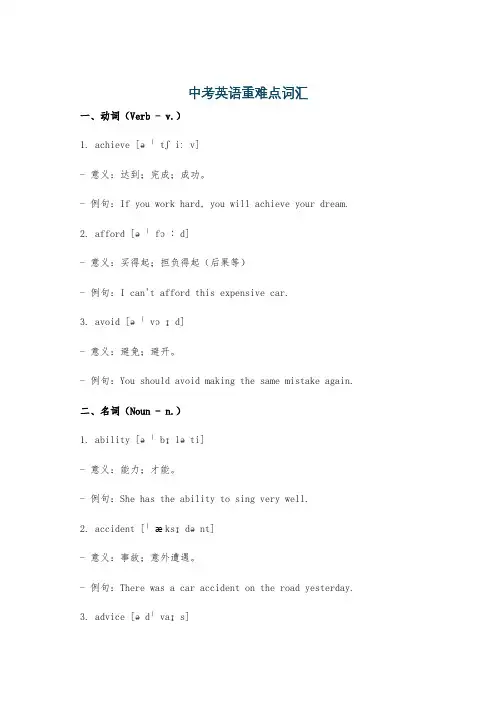
中考英语重难点词汇一、动词(Verb - v.)1. achieve [əˈtʃiːv]- 意义:达到;完成;成功。
- 例句:If you work hard, you will achieve your dream.2. afford [əˈfɔːd]- 意义:买得起;担负得起(后果等)- 例句:I can't afford this expensive car.3. avoid [əˈvɔɪd]- 意义:避免;避开。
- 例句:You should avoid making the same mistake again.二、名词(Noun - n.)1. ability [əˈbɪləti]- 意义:能力;才能。
- 例句:She has the ability to sing very well.2. accident [ˈæksɪdənt]- 意义:事故;意外遭遇。
- 例句:There was a car accident on the road yesterday.3. advice [ədˈvaɪs]- 意义:劝告;建议(不可数名词)- 例句:Can you give me some advice on how to learn English?三、形容词(Adjective - adj.)1. active [ˈæktɪv]- 意义:活跃的;积极的。
- 例句:He is an active boy in class.2. afraid [əˈfreɪd]- 意义:害怕的;担心的。
- 例句:She is afraid of dogs.3. amazing [əˈmeɪzɪŋ]- 意义:令人大为惊奇的;令人惊喜(惊叹)的。
- 例句:The magic show was really amazing.。
九年级英语常考单词
九年级英语常考单词共100个1. abandon -放弃2. ability -能力3. absorb -吸收4. academic -学术的5. access -访问6. accompany -陪伴7. accumulate -积累8. accurate -准确的9. achieve -实现10. acknowledge -承认11. acquire -获得12. adapt -适应13. adequate -足够的14. adjust -调整15. administration -管理16. admire -钦佩17. admit -承认18. adopt -采用19. advance -推进20. advantage -优势21. advertise -广告22. affect -影响23. afford -负担得起24. aggressive -侵略性的25. agriculture -农业26. aid -援助27. alert -警觉的28. allocate -分配29. alternative -替代的30. ambition -雄心31. analysis -分析32. ancient -古老的33. anger -愤怒34. annual -每年的35. anticipate -预期36. apparent -显然的37. appeal -吸引38. appreciate -欣赏39. approach -方法40. appropriate -适当的41. approve -批准42. argue -争论43. arise -出现44. aspect -方面45. assemble -集合46. assess -评估47. assign -分配48. assist -协助49. associate -联想50. assume -假设51. assure -确保52. atmosphere -氛围53. attach -附加54. attain -达到55. attitude -态度56. attract -吸引57. attribute -属性58. audience -观众59. authority -权威60. aware -意识到的61. balance -平衡62. barrier -障碍63. behavior -行为64. belief -信仰65. benefit -利益66. bias -偏见67. bond -联系68. brief -简短的69. budget -预算70. burden -负担71. calculate -计算72. campaign -运动73. capacity -能力74. category -类别75. challenge -挑战76. channel -渠道77. charity -慈善78. clarify -澄清79. classic -经典的80. clause -条款81. code -代码82. coherent -连贯的83. coincidence -巧合84. collapse -崩溃85. colleague -同事86. commence -开始87. commit -承诺88. commodity -商品89. communicate -沟通90. compare -比较91. compensate -补偿92. compile -编译93. complement -补充94. complex -复杂的95. component -组成部分96. compound -复合的97. comprehensive -全面的98. comprise -包括99. conceal -隐藏100. concept -概念。
九年级英语一到三单元知识点
九年级英语一到三单元知识点Unit 1 How can we become good learners?一、重点单词。
1. textbook (n.) 教科书;课本。
2. conversation (n.) 交谈;谈话,常用于短语“have a conversation with sb.”(与某人交谈)3. aloud (adv.) 大声地;出声地。
区别于“loud”(adj. 大声的,常用来修饰名词,如a loud voice)和“loudly”(adv. 喧闹地,侧重于嘈杂、喧闹的声音)。
例如:Read aloud to practice pronunciation.(大声朗读来练习发音。
)4. pronunciation (n.) 发音;读音。
例如:His pronunciation is very good.(他的发音很好。
)5. sentence (n.) 句子。
6. patient (adj.) 有耐心的;n. 病人。
常用搭配“be patient with sb.”(对某人有耐心)。
例如:Our teacher is patient with us.(我们的老师对我们很有耐心。
)7. expression (n.) 表达(方式);表示;表情。
例如:Facial expressions can show our feelings.(面部表情能展示我们的情感。
)二、重点短语。
1. make word cards 制作单词卡片。
2. listen to tapes 听磁带。
3. ask the teacher for help 向老师求助。
4. read aloud 大声朗读。
5. have conversations with 与……交谈。
6. give a report 作报告。
7. word by word 逐字地。
8. the secret to... ……的秘诀。
例如:The secret to success is hard work.(成功的秘诀是努力工作。
九年级英语单词重点
九年级英语单词重点一、Unit 1。
1. textbook ['tekstbʊk] n. 教科书;课本。
2. conversation [ˌkɒnvəˈseɪʃn] n. 交谈;谈话。
3. aloud [əˈlaʊd] adv. 大声地;出声地。
4. pronunciation [prəˌnʌnsiˈeɪʃn] n. 发音;读音。
5. sentence ['sentəns] n. 句子。
6. patient ['peɪʃnt] adj. 有耐心的 n. 病人。
二、Unit 2。
1. lantern ['læntən] n. 灯笼。
2. stranger ['streɪndʒə(r)] n. 陌生人。
3. relative ['relətɪv] n. 亲属;亲戚。
4. pound [paʊnd] n. 磅(重量单位);英镑(英国货币单位)5. folk [fəʊk] adj. 民间的;民俗的。
三、Unit 3。
1. restroom ['restru:m] n.(美)洗手间;公共厕所。
2. stamp [stæmp] n. 邮票;印章。
3. beside [bɪˈsaɪd] prep. 在……旁边;在……附近。
4. postcard ['pəʊstkɑ:d] n. 明信片。
5. pardon ['pɑ:dn] v. 原谅 interj. 请再说一遍。
四、Unit 4。
1. humorous ['hju:mərəs] adj. 有幽默感的;滑稽有趣的。
2. silent ['saɪlənt] adj. 不说话的;沉默的。
3. helpful ['helpfl] adj. 有用的;有帮助的。
4. from time to time 时常;有时。
5. score [skɔ:(r)] n. & v. 得分;打分。
初三英语重点知识归纳
初三英语重点知识归纳一、词汇1. 重点单词- 动词- achieve:达到;完成;成功。
例如:You can achieve your dreams if you work hard.(如果你努力工作,你就能实现你的梦想。
)- suggest:建议;提议。
suggest doing sth.(建议做某事),如:I suggest going for a walk.(我建议去散步。
)- remain:保持;依然;留下。
例如:She remained silent.(她保持沉默。
)- 名词- success:成功;成功的人或事。
形容词形式为successful,副词形式为successfully。
例如:His success made him famous.(他的成功使他出名了。
) - pollution:污染。
例如:Air pollution is a serious problem.(空气污染是一个严重的问题。
)- invention:发明;创造。
例如:The invention of the telephone changed our lives.(电话的发明改变了我们的生活。
)- 形容词- confident:自信的;有信心的。
be confident of sth.(对某事有信心),如:He is confident of passing the exam.(他有信心通过考试。
) - dangerous:危险的。
名词形式为danger。
例如:It is dangerous to swim in this river.(在这条河里游泳是危险的。
)- active:积极的;活跃的。
例如:He is an active student in class.(他在课堂上是一个积极的学生。
)2. 词汇拓展- able(形容词,能够的) - ability(名词,能力) - enable(动词,使能够)。
- 1、下载文档前请自行甄别文档内容的完整性,平台不提供额外的编辑、内容补充、找答案等附加服务。
- 2、"仅部分预览"的文档,不可在线预览部分如存在完整性等问题,可反馈申请退款(可完整预览的文档不适用该条件!)。
- 3、如文档侵犯您的权益,请联系客服反馈,我们会尽快为您处理(人工客服工作时间:9:00-18:30)。
九年级英语重点单词复习
pronunciation :(n.)发音, pronounce(v.)发音
differently :(adv) 不同地,different (adj.)不同的,difference(n.)不同frustrate :(v.)使沮丧frustrating,frustrated(adj.)沮丧的
spoken :(adj.)口语的 =speaking
solution :(n.)解决,(v.)solute
learn :(v.)学习, learner(n.)学习者
friend :朋友friendship友谊 friendly友好的
afraid : 害怕的,be afraid of +n.、v.ing
be afraid to + do sth
fair : 公平的,反义词unfair 不公平的
easy : (adj.)容易的easily (adv.)容易地
develop : (v.)发展development (n.)发展
agree :同意,反义词disagree disagreement(n.)同意
important : 重要的,反义词,unimportant ,importance(n.)重要
psychology : 心理学,psychologist 心理学家
day : 天,daily (adj.)每天的
die : (v.),死,dead(adj.)死的,death(n.)死
decide :(v.)决定,decision (n.),决心
pride : (n.)骄傲,proud (adj.)骄傲的
take pride in = be proud of
sleep : (v.)睡觉,asleep (adj.)睡着的 sleepy (adj.)困倦的oversleep(v.)睡过头
answer : (v.)回答= reply to
succeed : (v.)成功,success (n.)成功,successful (adj.)成功的。
medicine: (n.)药,medical(adj.)医学的
permiss : (v.)允许permission (n.)允许。
noise : (n.)噪音,noisy (adj.)吵闹的
honest : (adj.)诚实的,反义词dishonest 不诚实的
fish : (n.)鱼,fisherman (n.)鱼夫
late: (n.)晚的,latest (adj.)最近的
photograph (n.)照片,photography 摄影,照相photographer 摄影师
interest : (n.)兴趣,take an interest in = be interested in
suggest : (v.)显示,暗示,suggestion (n.)建议(可数n.)
energy : (n.)活力,energetic (adj.)有活力的
honest (adj.)诚实的dishonest 不诚实的
actual (adj.)实际的actually (adv.)实际上
main (adj.)主要的mainly (adv.)主要地
tire (v.)使劳累tiring (adj.)累的,tired (adj.)累的。
fascinate :(v.)使迷人fascinating (adj.)迷人的
thrill : 使害怕thrilling (adj.)令人激动的,thrilled , (adj.)激动的
take it easy on sth. sb. 从容对待某人、物
peace :(n.)和平peaceful (adj.)和平的,宁静的
tour : (n.)旅游,tourist (n.)游客,touristy (adj.)游客众多的
live : (v.)生活,(adj.)lively 充满活力的,living (adj.)活着的,活生生的,alive(adj.)活着的
translate : (v.)翻译,translator (n.)翻译员
will : 愿望,willing (adj.)乐意的。
Be willing to do sth 乐意做某
= hold on to (介词) doing sth : 乐意做某事
advertise : (v.)做广告,advertisement (n.)广告
hunger : (n.)饥饿,hungry (adj.)饥饿的
home : 家,(adj.) homeless : 无家可归的
donate : (v.)捐赠donation (n.)捐赠物
appreciate : (v.)感激appreciative (adj.)感激的
special : (adj.)特别的,specially (adv.)特别地
invent : (v.)发明,invention (n.)发明inventor (n.)发明家
salt : (n.)盐,salty (adj.)咸的
please : 使高兴,pleased ,(adj.)高兴的,pleasing = pleasant (adj.)高兴的pleasure (n.)乐意
indoor :在户内,反义词outdoor
wood : (n.)木头,woods 森林,wooden (adj.)木头的
world : 世界,worldwide (v.)世界范围的
popular : (adj.)流行的,popularity (n.)普及
embarrass :(v.)使尴尬,embarrassed ,embarrassing (adj.)尴尬的
exhaust :(v.)使精疲力竭,exhausted ,exhausting (adj.)精疲力竭的
empty : (adj.)空的反义词 full 满的,饱的
announce : (v.)宣布,announcement (n.)宣布通知
magic : (n.)魔术,magician 魔术师
familiar : (adj.)熟悉的,反义词unfamiliar
experiment : (v.)实验,experience (n.)经历
normal : (adj.)正常的,normally (adv.)正常地
science : (n.)科学,scientific (adj.)科学的,scientist (n.)科学家
danger :(n.)危险,dangerous(adj.)危险的endangered (adj.)危险的
mystery : (n.)神秘事物mysterious (adj.)神秘的
shine : (n.)阳光shiny (adj.)有光泽的
beauty : (n.)美丽,beautiful (adj.)美丽的
poem : (n.)诗,poet 诗人
south : (n.)南方,southern (adj.)南方的
strong : (adj.)坚定的,strongly 坚定地
play : (v.)玩,playful (adj.)玩皮的
spot :(n.)斑点,spotted 有斑点的
weigh :(v.)称,weight (n.)重量
pollute :(v.)污染polluted 被污染的
educate :(v.)教育 education (n.)教育
pull :(v.)拉,反义词push
roof :(n.)屋顶,复数roofs
busy :(adj.)忙的,business (n.)商业,生意
spare :空闲的同义词free
stuff :原料,复数stuffs
express :(v.)表达,expression (n.)表达
inspire :(v.)鼓舞inspiration (n.)鼓舞一心的人(事)
suit :(v.)适合,suitable (adj.)合适的
build :修建,building 建筑
home :家,home-made 自制的
true :(adj.)真的,truth (n.)真相
fair :公平的,反义词unfair
normal :(adj.)正常的normally :正常地
particular :特殊的 particularly 特殊地
relax :(v.)使放松,relaxing,relaxed 放松的
crowd :(v.)挤满,crowded (v.)拥挤的,uncrowded 不拥挤的stick :刺,插。
过去式stuck 过去分词stuck
lead :引导,过去式,led 过去分词led
think :想,认为,thought (n.)思想
from :从,form构成
greet :(v.)问候,greeting (n.)问候
Switzerland :瑞士,Swiss 瑞士的、人
organize :(v.)组织,organized (adj.)有组织的
shoot :射击过去式,shot,过去分词shot
shut : 关上,过去式shut ,过去分词shut
able :能,unable (adj.)不能,disabled (adj.)肢体有残疾的taste :品尝,tasty (adj.)味道好的
class :等级,classical (adj.)古典的
final :最后的,finally 最后地
own :赢,拥有,owner 所有者
knowledge :知识,knowledgeable (adj.)知识渊博的
worry :担心worried (adj.)担心的
confident :自信的confidence (n.)自信。
